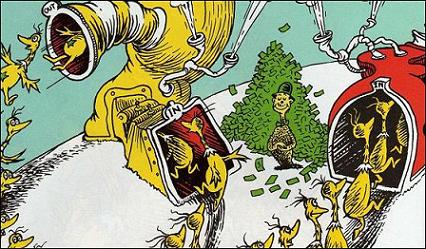In case you would doubt it, this blogpost is about ethics more than it is about children’s books.
The children’s book The Sneetches by Dr. Seuss is about a group of yellow creatures called Sneetches, some of whom have a green star on their bellies. At the beginning of the story, Sneetches with stars discriminate against those without.
Then it gets interesting as Sylvester McMonkey McBean enters the scene and offers the Sneetches without stars the chance to have them with his Star-On machine, for three dollars. They take his offer without hesitation.
However, this upsets the original star-bellied Sneetches, as they are in danger of losing their special status. McBean then tells them about his Star-Off machine, costing ten dollars, and the Sneetches who originally had stars happily pay the money to have them removed in order to remain special.
Eventually, this situation escalates, with the Sneetches running from one machine to the next, because everyone wants to be special and at the same time everyone wants to belong to the group.
This continues until the Sneetches are out of money and Sylvester McMonkey McBean leaves as a rich man. The Sneetches learn from this experience that neither plain-belly nor star-belly Sneetches are superior, and they are able to get along and become friends.
I often think about the character of Sylvester McMonkey McBean and how he is a metaphor for the state of our profession. What I mean is that more often than not, our job is about helping our clients to reach the star they crave for. And when things turn out differently or the customer wants another star, we happily apply our skills to help them reach that goal.
Well, lately I have come to think that this is a lousy way of making a living as an organizational change practitioner. Although there is nothing wrong with applying our craft to support our clients in reaching their goals, we must have some sense of direction with regards to those goals.
For instance if a client wants to implement an ERP system for the wrong reasons (because all their competitors are using it, or because they want to reduce the workforce working with IT-systems) we can easily support them, only to find out what we knew from the beginning: it just doesn’t work like that. Then, we can wait for the next big idea and start supporting that with all of our craft.
There is another way we can practice our craft. I think it is our moral obligation to have an opinion about the stars our clients are requesting and when their goals are conflicting with the goals or benefits we believe they ought to be pursuing, we should not behave like McBean. We should either walk away from the situation or transform it into a goal worth pursuing.
To the same extent as we have a responsibility to support our clients to the fullest of our capacity, we have a responsibility to speak up and share with them how we feel about it. Sometimes this means we will have to walk away. That’s the price we have to pay for practicing our craft responsibly.

